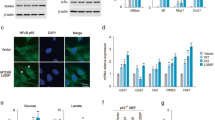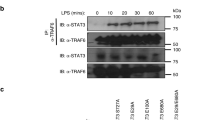Abstract
Signalling by the toll-like receptor (TLR) family of pathogen recognition receptors has emerged as a key molecular component in the pathogenesis of an increasing number of inflammatory-related cancers, among which gastric cancer rates as the second most lethal cancer world-wide. The myeloid differentiation factor 88 (MyD88) adapter molecule has a critical role in mediating innate immune signalling by members of the TLR and interleukin (IL)-1 families, and has been associated with either pro- or antitumourigenic responses in various cancer models. However, little is known about the in vivo role of MyD88 adapter-like (Mal)/TIR-domain containing adapter protein (TIRAP), which is restricted to facilitating TLR4 and TLR2 signalling. To interrogate the role of these innate immune signalling components in gastric tumourigenesis, here we have employed the spontaneous gastric cancer gp130F/F mouse model, in which TLR2 promotes the growth of gastric tumours. Genetic ablation of Myd88 in gp130F/F mice suppressed tumourigenesis and was associated with increased apoptosis and reduced proliferation in the gastric tumour epithelium, comparable to that observed previously upon deletion of Tlr2 in gp130F/F mice. By contrast, the tumour burden in gp130F/F:Mal−/− mice was equivalent to their gp130F/F littermates. At the molecular level, suppressed tumourigenesis in gp130F/F:Myd88−/− mice correlated with reduced expression and activation of TLR2-regulated protumourigenic genes and signalling pathways, respectively. Consistent with the previously defined non-essential role for TLR2 in gastric tumour inflammation, the extent of inflammatory cell infiltrates in gastric tumours from gp130F/F:Mal−/− and gp130F/F:Myd88−/− mice remained unaltered compared with gp130F/F mice. Collectively, our data reveal a differential, but inflammation-independent, requirement for Mal and MyD88 during TLR2-promoted gastric tumourigenesis.
This is a preview of subscription content, access via your institution
Access options
Subscribe to this journal
Receive 50 print issues and online access
$259.00 per year
only $5.18 per issue
Buy this article
- Purchase on Springer Link
- Instant access to full article PDF
Prices may be subject to local taxes which are calculated during checkout




Similar content being viewed by others
References
Milne AN, Carneiro F, O’Morain C, Offerhaus GJ . Nature meets nurture: molecular genetics of gastric cancer. Hum Genet 2009; 126: 615–628.
Uemura N, Okamoto S, Yamamoto S, Matsumura N, Yamaguchi S, Yamakido M et al. Helicobacter pylori infection and the development of gastric cancer. N Engl J Med 2001; 345: 784–789.
Tye H, Kennedy CL, Najdovska M, McLeod L, McCormack W, Hughes N et al. STAT3-driven upregulation of TLR2 promotes gastric tumorigenesis independent of tumor inflammation. Cancer Cell 2012; 22: 466–478.
Uno K, Kato K, Atsumi T, Suzuki T, Yoshitake J, Morita H et al. Toll-like receptor (TLR) 2 induced through TLR4 signaling initiated by Helicobacter pylori cooperatively amplifies iNOS induction in gastric epithelial cells. Am J Physiol Gastrointest Liver Physiol 2007; 293: 1004–1012.
Hold G, Rabkin CS, Chow WH, Smith MG, Gammon MD, Risch HA et al. A functional polymorphism of toll-like receptor 4 gene increases risk of gastric carcinoma and its precursors. Gastroenterology 2007; 132: 905–912.
Tahara T, Arisawa T, Wang F, Shibata T, Nakamura M, Sakata M et al. Toll-like receptor 2 -196 to 174del polymorphism influences the susceptibility of Japanese people to gastric cancer. Cancer Sci 2007; 98: 1790–1794.
Mandell L, Moran AP, Cocchiarella A, Houghton J, Taylor N, Fox JG et al. Intact gram-negative Helicobacter pylori, Helicobacter felis, and Helicobacter hepaticus bacteria activate innate immunity via toll-like receptor 2 but not toll-like receptor 4. Infect Immun 2004; 72: 6446–6454.
Kawai T, Akira S . The role of pattern-recognition receptors in innate immunity: update on toll-like receptors. Nat Immunol 2010; 11: 373–384.
Hoebe K, Jiang Z, Tabeta K, Du X, Georgel P, Crozat K et al. Genetic analysis of innate immunity. Adv Immunol 2006; 91: 175–226.
Yamamoto M, Sato S, Hemmi H, Sanjo H, Uematsu S, Kaisho T et al. Essential role for TIRAP in activation of the signalling cascade shared by TLR2 and TLR4. Nature 2002; 420: 324–329.
Santos-Sierra S, Deshmukh SD, Kalnitski J, Küenzi P, Wymann MP, Golenbock DT et al. Mal connects TLR2 to PI3Kinase activation and phagocyte polarization. EMBO J 2009; 28: 2018–2027.
Cole LE, Laird MH, Seekatz A, Santiago A, Jiang Z, Barry E et al. Phagosomal retention of Francisella tularensis results in TIRAP/Mal-independent TLR2 signaling. J Leukoc Biol 2010; 87: 275–281.
Kenny EF, Talbot S, Gong M, Golenbock DT, Bryant CE, O’Neill LA . MyD88 adaptor-like is not essential for TLR2 signaling and inhibits signaling by TLR3. J Immunol 2009; 183: 3642–3651.
Arbibe L, Mira JP, Teusch N, Kline L, Guha M, Mackman N et al. Toll-like receptor 2-mediated NF-kappa B activation requires a Rac1-dependent pathway. Nat Immunol 2000; 1: 533–540.
Shen Y, Kawamura I, Nomura T, Tsuchiya K, Hara H, Dewamitta SR et al. Toll-like receptor 2- and MyD88-dependent phosphatidylinositol 3-kinase and Rac1 activation facilitates the phagocytosis of Listeria monocytogenes by murine macrophages. Infect Immun 2010; 78: 2857–2867.
Naugler WE, Sakurai T, Kim S, Maeda S, Kim K, Elsharkawy AM et al. Gender disparity in liver cancer due to sex differences in MyD88-dependent IL-6 production. Science 2007; 317: 121–124.
Rakoff-Nahoum S, Medzhitov R . Regulation of spontaneous intestinal tumorigenesis through the adaptor protein MyD88. Science 2007; 317: 124–127.
Uronis JM, Mühlbauer M, Herfarth HH, Rubinas TC, Jones GS, Jobin C . Modulation of the intestinal microbiota alters colitis-associated colorectal cancer susceptibility. PLoS One 2009; 4: e6026.
Swann JB, Vesely M, Silva A, Sharkey J, Akira S, Schreiber RD et al. Demonstration of inflammation-induced cancer and cancer immunoediting during primary tumorigenesis. Proc Natl Acad Sci USA 2008; 105: 652–656.
Coste I, Le Corf K, Kfoury A, Hmitou I, Druillennec S, Hainaut P et al. Dual function of MyD88 in RAS signaling and inflammation, leading to mouse and human cell transformation. J Clin Invest 2010; 120: 3663–3667.
Ernst M, Najdovska M, Grail D, Lundgren-May T, Buchert M, Tye H et al. STAT3 and STAT1 mediate IL-11-dependent and inflammation-associated gastric tumorigenesis in gp130 receptor mutant mice. J Clin Invest 2008; 118: 1727–1738.
Jenkins BJ, Grail D, Nheu T, Najdovska M, Wang B, Waring P et al. Hyperactivation of Stat3 in gp130 mutant mice promotes gastric hyperproliferation and desensitizes TGF-beta signaling. Nat Med 2005; 11: 845–852.
Greenhill CJ, Rose-John S, Lissilaa R, Ferlin W, Ernst M, Hertzog PJ et al. IL-6 trans-signaling modulates TLR4-dependent inflammatory responses via STAT3. J Immunol 2011; 186: 1199–1208.
Salcedo R, Worschech A, Cardone M, Jones Y, Gyulai Z, Dai RM et al. MyD88-mediated signaling prevents development of adenocarcinomas of the colon: role of interleukin 18. J Exp Med 2010; 207: 1625–1636.
Schiechl G, Bauer B, Fuss I, Lang SA, Moser C, Ruemmele P et al. Tumor development in murine ulcerative colitis depends on MyD88 signaling of colonic F4/80+CD11b(high)Gr1(low) macrophages. J Clin Invest 2011; 121: 1692–1708.
Hutchinson E . Tumour immunology: Differing roles for MYD88 in carcinogenesis. Nat Rev Immunol 2012; 12: 681.
Grivennikov SI, Wang K, Mucida D, Stewart CA, Schnabl B, Jauch D et al. Adenoma-linked barrier defects and microbial products drive IL-23/IL-17-mediated tumour growth. Nature 2012; 491: 254–258.
Kennedy CL, Najdovska M, Jones GW, McLeod L, Hughes NR, Allison C et al. The molecular pathogenesis of STAT3-driven gastric tumourigenesis in mice is independent of IL-17. J Pathol 2011; 225: 255–264.
Bollrath J, Phesse TJ, von Burstin VA, Putoczki T, Bennecke M, Bateman T et al. gp130-mediated Stat3 activation in enterocytes regulates cell survival and cell-cycle progression during colitis-associated tumorigenesis. Cancer Cell 2009; 15: 91–102.
Acknowledgements
This study was supported by research grants from the Association for International Cancer Research (UK), the Cancer Council of Victoria (Australia) and the National Health and Medical Research Council (Australia), as well as the Operational Infrastructure Support Program by the Victorian Government of Australia. BJ Jenkins is supported by a Senior Medical Research Fellowship awarded by the Sylvia and Charles Viertel Foundation.
Author information
Authors and Affiliations
Corresponding author
Ethics declarations
Competing interests
The authors declare no conflict of interest.
Additional information
Supplementary Information accompanies this paper on the Oncogene website
Supplementary information
Rights and permissions
About this article
Cite this article
Kennedy, C., Najdovska, M., Tye, H. et al. Differential role of MyD88 and Mal/TIRAP in TLR2-mediated gastric tumourigenesis. Oncogene 33, 2540–2546 (2014). https://doi.org/10.1038/onc.2013.205
Received:
Revised:
Accepted:
Published:
Issue Date:
DOI: https://doi.org/10.1038/onc.2013.205
Keywords
This article is cited by
-
Identification of pyroptosis-related signature and development of a novel prognostic model in diffuse large B-cell lymphoma
Journal of Cancer Research and Clinical Oncology (2023)
-
The TLR/MyD88 signalling cascade in inflammation and gastric cancer: the immune regulatory network of Helicobacter pylori
Journal of Molecular Medicine (2023)
-
Characterization of extracellular vesicles from Lactiplantibacillus plantarum
Scientific Reports (2022)
-
Effect of TLR2 on the proliferation of inflammation-related colorectal cancer and sporadic colorectal cancer
Cancer Cell International (2020)
-
NF-κB-induced NOX1 activation promotes gastric tumorigenesis through the expansion of SOX2-positive epithelial cells
Oncogene (2019)



